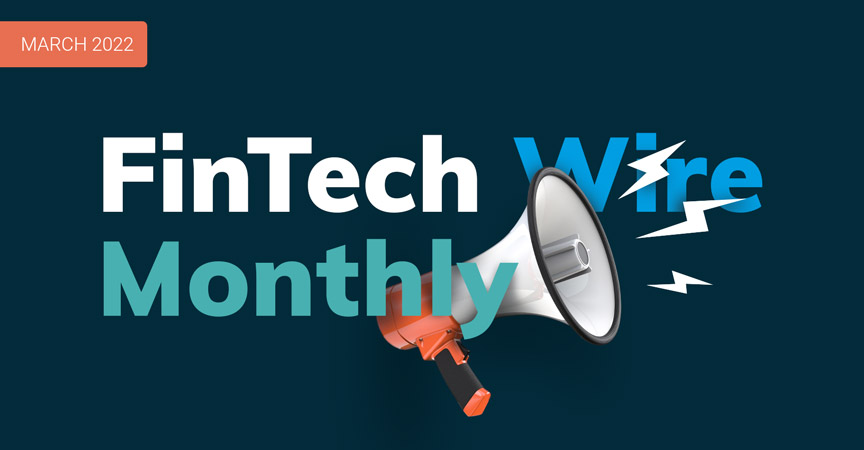Another month has passed and we’re back with our summary of the most important FinTech news. March 2022 was a difficult period, but many interesting events happened then too. Let’s dive in and pick the most important facts.

How global FinTechs help Ukraine
The brutal invasion on Ukraine is still going on, but globally, FinTech is also helping the brave defenders.
Aid for Ukraine initiative
The Ukrainian Ministry of Digital Transformation, with help of a public blockchain platform Solana and Everstake, a Ukrainian Web3 enterprise, has launched the Aid for Ukraine platform.It’s a super simple to use and accessible worldwide donation system dedicated to gather money needed by the Ukrainian government to withstand the Russian attack and buy the most important goods. Anybody can help!
Donation platform by Yapily, Token and Volt
Another platform was launched by the trio of British banking companies. Their website allows everybody to make donations to organisations that directly support Ukrainians in their homeland and Ukrainian refugees, such as Unicef, the National Bank of Ukraine and the Polish Center of International Aid.
This portal is a simple way of securely contributing to victims of this terrible crisis. It ensures donations arrive with the organisations instantly, and that there are no card fees, or SWIFT costs paid by the senders or the beneficiaries. We are working with three causes, so people donating are able to choose where their money goes.
Steffen Vollert, co-founder and chief operating officer at Volt
Sponsorships paid by Zopa Bank
Ukrainian refugees who are in the UK can now apply for work visas and Zopa will now sponsor some of them. Moreover, the bank will also help with relocation of those refugees who want to join their families in the UK plus offer a relocation allowance worth one month’s salary.
The People for People foundation
Bunq has started a foundation dedicated to providing accommodation to Ukrainian refugees in Bulgaria and Georgia. They are also going to offer free Bunq accounts to those who had to leave the country and need to be able to make payments in countries foreign to them.
FinTechs for Ukraine
FinTechs unite under the FinTechs for Ukraine community to raise funds for Save the Children’s Ukraine Appeal. The community was started by the virtual IBAN provider Monneo and involves 17 other companies, including Coinbase, ComplyAdvantage, Railsbank and payabl.
International Women’s Day in FinTech
According to Nita Bhalla’s article, the leading game-changers of the FinTech industry are female and they come from Africa. Her text reveals that there are twice as many women-led FinTechs than in the rest of the world and they thrive despite the gender bias in funding. Just to name a few, there is: Money Africa, Ladda, Lami, Okra, Griffin, Puno and Koa.
Oluwatosin Olaseinde, who has been leading Money Africa for over 4 years, is using her company to provide young people with knowledge on how to manage their finances. By subscribing to MoneyAfrica, they can enrol for dozens of fascinating courses and learn about everything related to finances and the financial market. But that’s not all Mrs. Olaseinde has managed to achieve. After the huge success of the educational platform, she has founded her own investment app, Ladda, where her students can use what they have learned in practice. What a complete ecosystem!
Collectively, the platforms have a 300,000-strong social media community and more than 15,000 active users. MoneyAfrica is projected to earn $1 million in revenue this year, said Olaseinde, and Ladda has $700,000 in assets under management.
Another great example of how women empower African FinTechs that the author mentions is Mrs. Jihan Abass from Kenya. After she noticed the problem of the insurance coverage among Africans, she founded Lami Technologies in 2018. Her goal was to create a fully fledged API based platform that enables businesses to offer flexible digital insurance products such as vehicle and health insurance to customers. To prove how good her product is, she also founded Griffin – an insurtech app where customers can get insured in minutes.
BaaS is on the rise
Finastra’s market assessment report shows that Banking as a Service is gaining significant momentum. According to the report, almost 85% of senior executives surveyed are already implementing or planning to implement BaaS in the next 12-18 months.
The research was conducted on 1600 senior executives from the industry and its goal was to reveal the truth about the demand for BaaS based services – and it did. Key findings are:
- 80% of regulated financial institutions expect the BaaS market to grow, many of them even expect a 50% growth in just five years.
- The market can be worth about USD 7 trillion.
- SME and corporate lending, as well as corporate treasury/FX services are going to be the first and fastest to develop.
There’s no doubt that BaaS is an incredibly exciting opportunity for the entire financial services ecosystem. Financial institutions can reach a greater number of customers at significantly lower cost, while distributor brands can open up new lines of revenue and build deeper relationships with their customers. It’s clear from our research that consumers (retail or corporate) are changing where they source financial services and shifting to non-bank channels. This trend will only accelerate as integrating regulated products into the customer journey becomes as simple as creating a social media account.
Angus Ross, Chief Revenue Officer, Banking as a Service at Finastra
See you next time!
This would be all for this month’s most interesting FinTech news, remember to subscribe to our social media (LinkedIn, Twitter, and Facebook) to stay updated every time we publish new, spicy content.